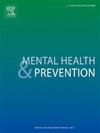A school-based program to prevent depressive symptoms and strengthen well-being among pre-vocational students (Happy Lessons): Results of a randomized controlled trial
IF 2.4
Q2 Medicine
引用次数: 0
Abstract
Background
Many adolescents experience depressive symptoms, with even higher prevalences among lower-educated Dutch students. Effective prevention programs for these students are scarce but needed. This randomized controlled trial (RCT) investigates the effectiveness of school-based prevention program Happy Lessons (HL) among Dutch pre-vocational students.
Methods
Classes within schools were randomized to intervention (n = 124) or waitlist control group (n = 143). Students (n = 267, aged 11 to 15) completed questionnaires at baseline, 3- and 6-month follow-up. The primary outcome was depressive symptoms. Secondary outcomes were well-being and life satisfaction. Linear mixed models were executed, based on the intention-to-treat principle. Explorative analysis of the effect of HL on potential mechanisms such as class and school environmental variables was conducted. Trial registration: Dutch Trial Register NL9732.
Results
This study found no statistically significant differences in favor of the intervention group on depressive symptoms (T1: Cohen's d [95 % CI] = -0.21[-0.49;0.07], T2: -0.20 [-0.48;0.08]), well-being (T1: 0.24 [-0.04;0.52], T2: 0.18 [-0.10;0.47]), life satisfaction (T1: 0.03 [-0.25;0.31], T2: 0.10 [-0.18;0.39]), classmate support (T1: -0.20 [-0.48;0.08], T2: -0.14 [-0.43;0.14]), school connectedness (T1: -0.08 [-0.36;0.20], T2: 0.20 [-0.08;0.49]), bullying others (T1: OR[CI] = 0.95 [0.68;1.32], T2: 0.92 [0.66;1.29]) and bullying victimization (T1: OR[CI] = 1.93 [0.73;5.15], T2: 1.61 [0.62;4.20]). Significant moderate effects were found on teacher support in favor of the intervention group at T1 (d[CI] = -0.37 [-0.65;-0.08]) and control group at T2 (d[CI] = 0.35 [0.07;0.64]).
Conclusions
Further research should focus on the working mechanisms of school-based depression prevention programs and how to successfully implement these programs in the school context.
以学校为基础的预防抑郁症状和加强职前学生幸福感的项目(快乐课程):一项随机对照试验的结果
许多青少年都有抑郁症状,在受教育程度较低的荷兰学生中患病率更高。针对这些学生的有效预防项目很少,但很有必要。本随机对照试验(RCT)调查了荷兰职业前学生中以学校为基础的预防项目“快乐课程”(HL)的有效性。方法将学校内的班级随机分为干预组(n = 124)和候补组(n = 143)。267名11至15岁的学生在基线、3个月和6个月的随访中完成问卷调查。主要结局是抑郁症状。次要结果是幸福感和生活满意度。基于意向-处理原则,执行线性混合模型。探索性地分析了课堂环境变量和学校环境变量等潜在机制对课堂学习的影响。试验登记:荷兰试验登记NL9732。ResultsThis研究没有发现显著差异的干预组对抑郁症状(T1:科恩的d(95%置信区间)= -0.21 (-0.49,0.07),T2: -0.20[-0.48, 0.08]),福利(T1: 0.24 (-0.04, 0.52), T2: 0.18[-0.10, 0.47]),生活满意度(T1: 0.03 (-0.25, 0.31), T2: 0.10[-0.18, 0.39]),同学的支持(T1: -0.20 (-0.48, 0.08), T2: -0.14[-0.43, 0.14]),学校连通性(T1: -0.08 (-0.36, 0.20), T2: 0.20[-0.08, 0.49]),欺负他人(T1:OR[CI] = 0.95 [0.68;1.32], T2: 0.92[0.66;1.29])和欺凌受害(T1: OR[CI] = 1.93 [0.73;5.15], T2: 1.61[0.62;4.20])。干预组在T1 (d[CI] = -0.37[-0.65;-0.08])和对照组在T2 (d[CI] = 0.35[0.07;0.64])时对教师的支持有显著的中等影响。结论应进一步研究校本抑郁预防项目的工作机制以及如何在学校环境中成功实施这些项目。
本文章由计算机程序翻译,如有差异,请以英文原文为准。
求助全文
约1分钟内获得全文
求助全文
来源期刊

Mental Health and Prevention
Medicine-Psychiatry and Mental Health
CiteScore
2.10
自引率
0.00%
发文量
22
审稿时长
24 days
 求助内容:
求助内容: 应助结果提醒方式:
应助结果提醒方式:


